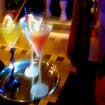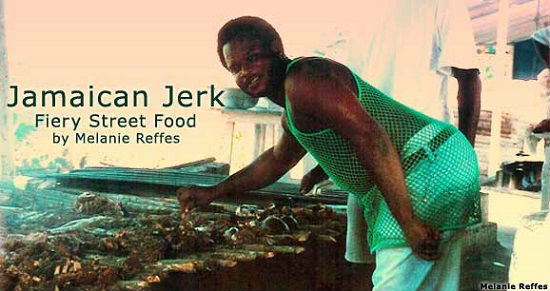

“Ever since I knew, myself,” quips Donovan Thompson in his charming Jamaican patois, “my Uncle Taric told me never to tell anyone exactly what’s in our jerk.”Sweating over the open fire at Mickey’s Jerk Pit in Port Antonio’s Boston Bay and zealously guarding the family secret, the muscular 32-year-old, who learned the art of jerk from his uncle, swears it’s the best on the island. “My jerk is ‘more-ish,’” he explains, using a typical Jamaican expression with the flair of a philosopher: “After you eat it, you want more.”
At the base of the Blue Mountains, renowned for coffee-growing, and down the road from the movie-famous Blue Lagoon, Port Antonio, on the northeast coast of Jamaica, is the capital city of Portland Parish. Two hours up the coast from Kingston, this non-resort town is the birthplace of jerk, and where Jamaica’s best jerkers still practice the centuries-old art of grilling meat slowly over a low fire.
Jerk dates to the aboriginal people of Jamaica, the Arawak and Carib Indians, who developed a mixture of salt and spices to preserve meat in the island heat. During the 17th century, runaway slaves from West Africa, called Maroons, carried on the jerk tradition by blending peppers and salt and a few mystery herbs they picked in the mountains.
They slathered this spicy mixture on the wild boars they killed for food, then lowered the spice-rubbed hogs into large, open fire pits lined with hot stones and smoldering green pimento wood.
The pork would steam slowly in its own juices for up to two days. Descendants of the Maroons living near Port Antonio today still honor the secret of their ancestors’ recipe. “Over there in the hills” is where they point if you ask about those mystery herbs.
Thompson says “jerk” refers to the movement he does in the pit seven days a week. “I jerk the meat over and over for hours and hours,” he explains with a fluorescent-white grin. Actually, the word is thought to derive from the Arawak Indians’ word for “preservation of beef,” charqui.

Jerk, however, refers not only to the grilling process, but also to the seasoning blend. In order for a jerk rub to be true to its roots, it has to start with the Jamaican allspice berry, or pimento, thyme and the wickedly hot, wrinkly pepper called a Scotch bonnet.
After that it’s up to the jerk man to improvise with soy sauce, ginger, onions, lime juice, brown sugar, garlic and even rum. It’s the Scotch bonnet, jerk aficionados will tell you, that’s earned jerk its eye-watering and fiery reputation.
Roadside huts are in every small town in Jamaica, offering a smorgasbord of jerk pork, chicken, fish and even lobster; urban jerkers transform steel drums into jerk pits on the crowded streets of downtown Kingston; and the upscale resorts in Montego Bay, Ocho Rios and Negril have jerk on their buffet menus.
But the hub of jerk is Boston Bay. A fragrant, smoky aroma entices passersby to stop and sample from one of the dozen or so open-air huts with names like Miss Ivy’s, Shaggy’s, Glasses Jerk Centre and Little David’s. “It’s the best at Mickey’s,” boasts Thompson to the busload of hungry tourists who just pulled up, “My jerk is good for your health, mon!”
This is casual dining at its finest. No cutlery, no menus and no frills. Each hut has a single pole supporting a thatched or tin roof. The meat and fish is jerked inside the hut or under a nearby tree, and a few tattered chairs and picnic tables are scattered about.
Your portion is pulled off the bone, weighed to your specifications (150 Jamaican, about US$ 2.3, for a quarter-pound of chicken), laid on newspaper and handed over on a paper plate. Ask for a “festival,” a sweet hush puppy, to mop up the extra sauce. To cut the heat of the peppers, a cold Red Stripe beer or a refreshing bottle of Ting, the Jamaican grapefruit soda, will do the trick.
“Never drink water to calm down the fire,” Thompson advises wisely, “all it does is spread around the heat.”
Although cajoled by their customers, Uncle Taric and Thompson will never reveal the secret ingredients in their jerk, but they will sell their jerk rub in a bottle for 350 Jamaican dollars (US$ 5.4).
Take it away and don’t ask questions. Some secrets have to stay in the family.
More than 500 years after Christopher Columbus first spotted Jamaica and called it the “fairest island that eyes have beheld,” its food has become as popular as its natural beauty. As the song goes, there may be a cheeseburger or two in this paradise, but jerk is, indeed, the national taste treasure.
If You Go
Jamaica Tourist Board
800-233-4JTB
Port Antonio
www.portantoniotravel.com
- Vienna’s Wine Country: Sipping Your Way Through Europe’s Only Capital City Vineyards - June 27, 2025
- Hidden Coastal Gems: 4 Small Beach Towns That Beat the Crowds - June 22, 2025
- How to Spend 48 Perfect Hours in Honolulu - June 20, 2025
